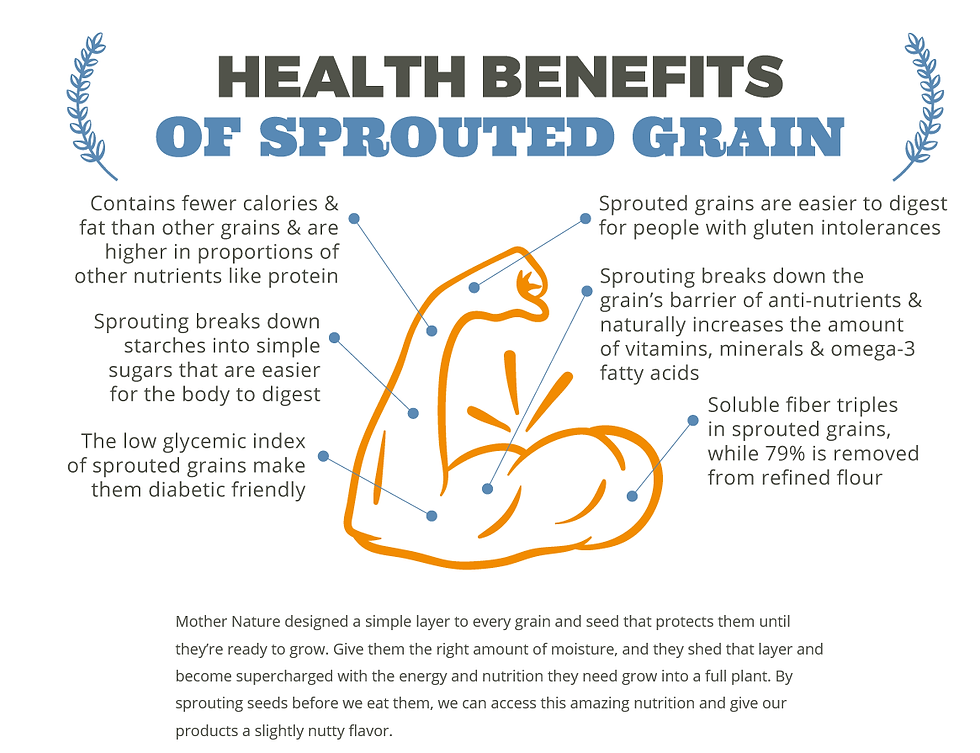White..Wheat - NO! Why So Serious About Sprouted Grains?
- Shalie Kae Bireta
- Mar 21, 2018
- 3 min read
SAY NO TO WHITE AND WHEAT! You're all probably sitting there thinking okay Shalie, tell me something I don't know...
Well, let's refresh on what white and whole wheat products are and are not. Then, we will touch on the health benefits brought by sprouting grains.
White Flour is a refined grain is created when a whole grain is finely ground and stripped of its bran and germ, also known as the elements that contain fiber, vitamins and minerals. This is why white bread is said to be low in fiber. Refined grains are also LOW in magnesium, zinc, vitamin E, fiber and essential fatty acids. Some manufacturers add vitamins back in, but does that sound silly to anyone else but me? I'd rather a natural source that didn't remove them in the first place...
White bread has a high glycemic index ( how quickly and how much a food affects your blood sugar and insulin levels compared with pure glucose) because refined grains are rapidly absorbed during digestion, causing sharp spikes in blood sugar and insulin levels. A" diet that includes a lot of white bread and other high-glycemic foods -- like sweets, candy, desserts and white potatoes -- increases your risk for weight gain, type 2 diabetes and heart disease," according to the Harvard School of Public Health. Elevated blood sugars also cause complications when the glucose reacts with proteins in the body. This aids in aging.
Wheat Flour bread and other products labeled “whole grain” are usually made with flour. Finely textured whole wheat bread has the same glycemic indexas white bread, digesting and then piking blood sugar rapidly.
Have you ever experienced indulging in carbs and then catching yourself soon after craving more carbs? The large spikes in our blood sugar followed by rapid drops tend to stimulate hunger and then call for another high-carb meal AKA the “blood sugar roller coaster.”
Whole grains that contain more fiber are supposed to lead to slower rises in blood sugar. While that aspect makes it a superior choice to white bread, wheat contains a substance called phytic acid, which can reduce absorption of important minerals. Phytic acid can bind minerals like calcium, zinc, iron and magnesium and prevent them from being absorbed. Whole wheat contains even more phytic acid than refined wheat . It can cause people to burn through their Vitamin D stores faster, contributing to deficiency. In gluten sensitive individuals, the digestive lining can become damaged due to phytic acid, which can affect the absorption of not just some but all nutrients.
How does sprouted bread differ from whole wheat and white bread???
White bread is made by removing the wheat kernel's germ and bran (where the nutrients are), grinding up only the endosperm into flour.
Whole-wheat bread is made by grinding wheat kernels into whole-wheat flour. Whole wheat provides fiber, and naturally-occurring vitamins and proteins.
Sprouted-grain bread is made from wheat kernels that have been sprouted, grounded and baked into bread. This process retains more of the nutrients

(photo credit: https://www.angelicbakehouse.com)
Sprouted grains are far easier to digest than whole grains and aid healthy levels of cholesterol. The sprouting process allows the increase of protein, while it reduces the carbohydrate content. Sprouted grains have low gluten content and three times more soluble fiber than regular grains. The increased content of fiber, vitamins, minerals and phytonutrients sprouted grains are quite gentle to the body's blood sugar. Sprouted grains bring increased levels of nutrients and increased availability of these nutrients for the human body as the sprouting process makes available higher amounts of vitamins, minerals and proteins... especially true for iron, folate, essential amino acids, vitamin E, vitamin C and B vitamins .The increased iron and zinc availability from sprouted grains stem from reduced phytic acid compound content, which would normally bind these minerals in grains. They are also full polyphenol antioxidants. As if all these health benefits aren't enticing enough, young grains tend to have more flavor, and are sometimes on the sweeter side, when compared to the grown grains.
Benefits of Sprouted Grains
#1 Digestive advantage
#2 Cholesterol levels
#3 Blood sugar assistance
#4 Carbs and gluten levels
#5 Increased vitamins and minerals
#6 Low phytic acid
#7 Antioxidants
#8 Taste
Bireta Bites Recommended Brands for Sprouted Grains :
Ezekial (Bread, English Muffins, Wraps, Cereal) - found in the frozen section of grocery stories, Thrive Market

Angelic Bakehouse ( Bread, Pizza Crust, Buns, Baguette, Crisps, Wraps) - website, Fresh Thyme, Costco, local health food stores

Kashi (Sprouted Grain Cereal) - Walmart, Amazon, Fresh Thyme
**Given the trend toward sprouted grains, these are not the ONLY brands that are making products with sprouted grains but they are the ones that I personally know, love, and rely upon. If you find any other brands with a great sprouted grain product, I would love if you would share it with me!**










Comments